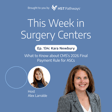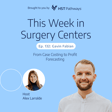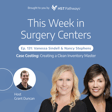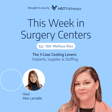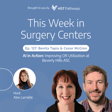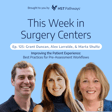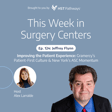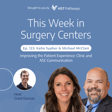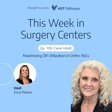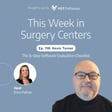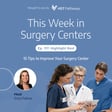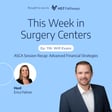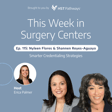Introduction and Format Overview
00:00:01
Speaker
Welcome to This Week in Surgery Centers. If you're in the ASC industry, then you're in the right place. Every week, we'll start the episode off by sharing an interesting conversation we had with our featured guests, and then we'll close the episode by recapping the latest news impacting surgery centers. We're excited to share with you what we have, so let's get started and see what the industry's been up to.
Focus on Cardiovascular ASCs
00:00:27
Speaker
Hi, everyone. Here's what you can expect on today's episode. We've explored a lot of topics about opening an ASC, but today's episode takes a deeper dive into something a little more specific, but very exciting. Joining us are three experts from Align ASC to talk about what it takes to open an ASC with a cardiovascular focus.
00:00:49
Speaker
CV is one of the hottest specialties right now with reimbursement per case ranking second only to orthopedics. But with great opportunity comes unique challenges for sure, feasibility, construction, staffing, tech, and so much more. This was a really interesting conversation and I learned a ton myself, so I hope you all enjoy it.
00:01:09
Speaker
In our news recap, we'll cover ASCA's latest survey regarding access to anesthesia, how AI models are being publicly ranked by health systems, the critical role of surgery centers during national emergencies, and of course, end the new segment with a positive story about a nurse who went above and beyond to help a family in need. Hope everyone enjoys the episode and here's what's going on this week in Surgery Centers.
Business Models and Market Alignment
00:01:38
Speaker
Nathan, Mark, and Chuck, welcome to the show. Excited to have you guys on this week. Thanks for having us. yeah As we jump in here, I was hoping to ask you a little bit about Align Health and in your role in this ASC space. Can you tell us a little bit about Align and where you focus? Sure. we've ah We developed Align a couple of years ago and we created the the ah company and the name align to better align with the physicians in the market. So we have a unique offering. We do not take equity and we have a kind of a fixed fee approach to how we develop and manage surgery centers. Fantastic. And within the cardio specialty area, there's a ton of buzz right now. I know you guys follow that closely. What's what's going on right now with cardio in the ASC space and why is there so much interest and buzz around it?
Medicare Approvals and Equity Trends
00:02:29
Speaker
Yeah, this is Mark. I can speak to that. I've been part of this cardio out migration trend for about the last 10 years. And if we rewind the clock and look at 2009, that's when Medicare approved peripheral arterial disease or PAD cases in the office space setting. Then around 2015, Medicare added pacemaker and device implants on the covered procedure list for surgery centers.
00:02:52
Speaker
And then really the watershed moment was 2020 when Medicare added PCI, which is heart stenting on the covered procedure list for surgery centers. That was really the trigger to get us to this point today where there's this flurry of activity in CON states, in non-CON states with health system joint ventures.
00:03:12
Speaker
with independent cardiology group, with a bunch of private equity folks now buying cardiology practices and then opening surgery centers for all their cardiology platforms. So really the buzz has been going on since 2009. I also work as an advocate and we pushed hard to get EP ablations.
00:03:30
Speaker
added to the covered procedure list for 2025, unfortunately we didn't, but we have societal support from HRS, the Heart Rhythm Society, so everyone is very optimistic that we'll see that added to the covered procedure list in 2026. We're also advocating for some structural heart procedures, one's called the Watchmen, it's a left atrial appendage occlusion device, and TAVRs, which are transaortic valve replacement procedures to be added into the covered procedure list over the next three to five years.
00:03:58
Speaker
So we really think that moment in 2020 with PCI changed the dynamics. And now, as I mentioned, from health systems to independence, we're seeing a lot of activity.
Reimbursement Trends and Patient Demand
00:04:08
Speaker
Got it. And so you hit on there some great points on the covered procedure list and in case volume. What do you see is going on the reimbursement side of the house as it relates to these procedures and reimbursement rates and ASCs versus other settings?
00:04:26
Speaker
I can talk a little bit about CV and then Chuck and Nate can can dive in about other multi-specialty centers. We're seeing the rates in office-based labs decline and the rates in surgery centers increase. For example, this PAD, these cases I mentioned that shifted in 2009, they've taken a consistent single, sometimes double-digit reduction over the last few years while in surgery centers we've seen the rates increase. We got about a 5% increase for 2020.
00:04:54
Speaker
2025. So we really see Medicare as shifting cases, I don't want to say away from the outpatient center, but shifting them to the surgery center. Whereas we all know they're regulated and accredited and they're different than the office space lab. So in that specific scenario, we're seeing rates hold and maintain in the surgery center space.
00:05:13
Speaker
And I think we all know when cases first get approved, there's usually that honeymoon period where rates stay the same, hopefully for five or six or eight years. We're seeing only maintaining but growth in in pacemaker implants in this in PCI and in those PAD cases. So things look good right now, that can always change, but there are a couple of advocacy groups that are really active in in the lobby work for cardiovascular procedures in the surgery center. Fantastic.
00:05:39
Speaker
And there's a lot of discussion around cardio right now in the ASC world. But when we zoom out and look at overall procedure volume within the ASC setting, cardio is still relatively low. Are there other procedures? You mentioned ablations earlier. Are there other procedures that you foresee when they do get out of the procedure list have the potential to really shift and drive even more case volume?
00:06:07
Speaker
So one thing to understand with cardiology is we're at an inflection point right now where we're losing cardiologist, they're aging out, and yet the the demand of patients is exploding.
00:06:17
Speaker
So we're really in a funky spot here in the next five to 10 years with access to care just because of that dynamic. Not enough doctors, too many patients. So how and where do we treat them? Most hospitals for ablations, for example, have about a six to eight week lead time to get a patient in. So we need, the health system needs some system to decant these hospital cath labs.
00:06:39
Speaker
from their just continued explosive growth, and we can decant them to ah an efficient, easy to run, value-based side of care like a surgery center. So that's where I see the next five to 10 years being so optimistic and and so positive for the cardiology space. Not enough doctors, too many patients, and cath labs, where most of them are busting at the seams.
00:07:02
Speaker
So there's busting at the seams, there's volumes that need to be absorbed elsewhere in an outpatient setting. Do you see most of this volume or demand being absorbed by existing ASCs that may add on cardio as an area of focus? Or do you see more cardio specific ASCs being developed?
Revenue and Equipment Needs in Cardio ASCs
00:07:21
Speaker
Yeah, it's definitely the latter and and for for kind of three main reasons. We believe and align, and I know a lot of folks are aligned with us, no pun intended, that mixing cardio with other specialties has its issues, specifically net revenue per case. Our net revenue per case is nearly 8,000. And when we add ablations and watchmans, our net revenue per case is going to be north of 10,000. So a big difference between a GI center.
00:07:46
Speaker
Secondly, staffing is different. CapLabs are unique. We have unique staff. We have unique recovery. We have unique equipment. We need to equip each room with about a million dollars worth of imaging and software. So the other specialties may not want to pay for that capital cost.
00:08:02
Speaker
So it started to hit on some of the differences there with cardio and the requirements versus other specialties. Talk a little bit about staffing, talk a little bit about equipment. Can you expand on equipment? Because that's such a big one, right? And you mentioned it can be a million dollars to add some of this equipment that needs to go into cardio focused ASCs. Tell me more about that and some of the equipment differences versus other specialty areas.
00:08:29
Speaker
I think from an IT perspective alone, there's so many different systems to weave together into a coherent chart document. There's the hemodynamic system is the key piece within the cardiovascular ASC.
00:08:45
Speaker
Getting all of that to tick and tie together with the electronic health record is a trick and it really requires a great deal of expertise. In the surgery centers, I like to say they are surgery centers, but they are nuanced and one of the big nuances in a cardiovascular center is that fixed C-arm and they can be floor or ceiling mounted. So you have to have engineering look at your weight support and your ceiling heights, etc.
00:09:10
Speaker
We'll have a control room for each of those fixed CR rooms and an uninterrupted power system. A few nuances that are different from a typical surgery center.
Staffing and Revenue Management
00:09:18
Speaker
We have a higher number of pre and post bays due to the higher utilization of radial access. You have higher turnover. And then we don't have a huge need for sterile processing department in cardiovascular centers yet.
00:09:33
Speaker
Great. Tell me more about staffing and the types of experience that you're you're looking for when you're looking to staff up. I would love to take this one. So my background comes in registered nursing. seeing and one ah one of the best types of nurses to have here is is a great critical care nurse. This can come from the emergency department, ICU, cath lab, someone who's used to managing these types of patients post procedure because If it would be equivalent to an ICU nurse versus a med surg nurse, they have different skill sets and different focuses. And so what we need is the ICU skill set to where if there's a nine beat run of ventricular tachycardia in the PACU, that the nurses don't panic. They realize this is comes with the territory of interventional heart stuff and let's not all freak out. So staffing, like you said, is critically important and hiring the right staff, I think is the most important thing.
00:10:33
Speaker
Great. Do you look for people that have worked in a cath lab before? Absolutely. I think that's the number one precursor for experience that we need to build on. And then in the pre-op and recovery areas, the lab experience is important, but I think also intensive care and emergency department nurses can handle the groins, access sites, and then post-operative care needs from a hemodynamic standpoint, understanding what's pressure what pressures are concerning, understanding what rhythms are concerning and which ones are par for the course after an ablation and which ones are somewhat normal. What about implants? With staining procedures and types of procedures that are going on here, how important do you implants, purchasing of implants, the tracking of the expense and the profitability impact of those implants, how does how is that may be different than other specialty areas? I don't think logistically
00:11:33
Speaker
From a procurement standpoint, it's much different. We typically consign all of our implants. And when we talk about implants, we talk about pacemakers, AICDs, and loop recorders. So they're they're consigned, first of all. And secondly, just to illustrate, they will drive, those implant procedures will drive 75 to 80% of the revenue in the surgery center.
00:11:54
Speaker
So those are the Holy Grail in a cardiovascular surgery center. We can do left heart catheterizations all day long and a stent here and there, but really what pays the bills are those EP, those electrophysiology implants. So let's talk about purchasing differences that we should consider for cardio versus other specialty types. We've talked about upfront equipment charges and CAPEX that go into these facilities.
00:12:20
Speaker
cardiophocus centers think about purchasing an upfront CapEx that goes into this? Sure. One of the main things we look for are opportunities with these equipment vendors at the front end of the development and project to see if there's a way that they can partner with the surgery center to really bring in the equipment on a capital lease program and Really the physicians work that off over time through use of a partnered implant company, say Abbott or Medtronic or any of them, really. Mark, do you care to elaborate on this as well? Any additional perspectives?
00:12:59
Speaker
No, that's a good point. Reducing your capital spend with an agreement with one of these vendors makes a lot of sense. And they're all competing with each other. They all have a preferred imaging vendor. And what I've learned through the years is the imaging vendor is really not highly important to the physicians. Driving the best deal is. So whether the imaging vendor is vendor A, B, or C, it doesn't matter. It's what does that contract look like. They're usually market share agreements.
00:13:26
Speaker
or their total spend agreements. And those companies that Nate mentioned earlier cover the whole sphere of what we do. They cover the PAD cases, they cover the implant cases, and they cover the cardiology cases for stents. So they're making it really easy for us to to get capital equipment at no charge. That's good. So it sounds like you don't find those agreements to be too limiting in terms of supplies you have access to.
00:13:49
Speaker
Yeah, not at all. We would would never sign, and I think everybody on this who listening to this podcast would agree, we wouldn't sign 100% contract with any one vendor. But market share agreements are fine. And as we we look forward to oblations, there's a large capital expenditure for ablation procedures, more than a half a million dollars for a mapping equipment. And the vendors that make the catheters for the ablation cases will also offer a no cap or a volume based agreement. As I said a second ago, they're making it pretty easy for us to save capital if we align with them.
00:14:19
Speaker
So continuing along the line of differences for cardio, cardio procedures versus other procedures, want to touch on revenue cycle management and billing in particular. Are there considerations for cardio facilities around how they do billing and revenue cycle that are maybe different than some other specialty areas? Yeah, I think the reimbursement is larger. The the expenses are higher. So there's a lot at stake here. And I think the answer is.
00:14:45
Speaker
Find a partner that has the expertise that has done this before. That would be our best recommendation. Great. Can I shift over here and and talk about specifically if that's okay. You guys work with cardio centers. Tell me some of the areas, because we've just gone through all these differences and all these considerations for cardio facilities that are out there, the wave of cardio facilities that we anticipate in the years ahead. From an aligned health perspective, where are the areas that you feel like you can work with cardio facilities and add the most value to everything that they're working through and considering. I'll start. I think the first thing that we do well is developing a feasibility study. We want to make sure that we're doing all the right things, that that we understand all of the pretty big expenses, the lease, the facility, the equipment, all of those things have to
00:15:38
Speaker
really come together into a business plan that makes sense given the volume and the case types that we're we're working with, the physicians that are going to come work at the center. I think another, an additional area that that is a hot a bit of a hot topic right now is the personal guarantee. I think when, at least when Chuck started developing centers, this was not even a requirement for a lot of a lot of surgery centers. They would be guaranteed by the property itself.
00:16:05
Speaker
At this point, any one of these centers is going to require a personal guarantee on the financing for the center. So that's a big part of the feasibility study is helping helping the doctors really understand this if they're entering the market without a hospital. Partner.
00:16:20
Speaker
This is really going to be probably eight or $10 million dollars of guarantee that they're going to have to sign up for. And that's oftentimes ah really important in the first, first discussions is to have everyone get around that rallied around that and understand what's going to be required because without that, the project won't move forward.
00:16:40
Speaker
and And part of the the feasibility study includes these are new cases, new new surgery centers, I should say, with physicians are moving cases to an outpatient setting that they haven't done that before. And so really looking at safety.
00:16:55
Speaker
proximity to the hospital. These aren't GI cases where if you have a ah perforation, you can take a case of the hospital and time isn't of the essence necessarily, but in the cardiovascular setting, you're working around the the heart. And so you really need to do these a little bit differently. Put a lot of effort into looking at centers that are on or near hospital campuses. There are some states that require the ASC to be on the hospital campus for safety purposes. So I think that's a really big of note to, I don't know how to say it,
00:17:24
Speaker
to make sure that your ASC has safety first, especially when it comes to a cardiovascular ASC. Great. Final question for you guys. We do this every week with our guests. What's one thing our listeners can do this week to improve their surgery centers? Yeah, I think a lot of surgery centers, in fact, most that we evaluate, do not have a ah line of sight into their accounting, tying their accounting to revenue.
00:17:48
Speaker
to volume, to really their patient accounting system. And we're talking about budgeting properly, estimating revenue properly, accruing so that you can really see your expenses and revenue in the period and you can understand your business and how it reacts to the different levers that you pull. And so only then if you've got all that tied together can you truly know if you're being efficient and optimizing your ah ROI. Thank you guys so much for joining this week. Appreciate it for your time. Thanks for having us.
00:18:19
Speaker
As always, it has been a busy week in healthcare, so let's jump right in.
Anesthesia Access and AI in Healthcare
00:18:24
Speaker
In a recent 60-second survey by ASCA, surgery centers are seeing improvements in access to anesthesia services. The survey, which was conducted in October of 2024, gathered responses from 320 ASCs across 46 states. And here's what stood out. 70% of respondents reported adequate access to anesthesia providers.
00:18:47
Speaker
That's an increase from 64% in 2023 56% in 2022. However, access did vary by facility size. So smaller surgery centers that had one to two ORs fared better with 81% reporting adequate access, while only 61% of larger facilities reported adequate access. And that was considered surgery centers with five or more ORs.
00:19:12
Speaker
And when asked what the biggest challenges are, low supply of providers is no surprise. The number one issue while competition and low reimbursement rates also played major roles.
00:19:23
Speaker
What I found super interesting though is how the the shift we're seeing in smaller ASCs being able to bring their ah anesthesia services in-house. The majority of ASCs do still rely on contracted anesthesia providers. 82% reported contracting this year, although that is slightly down from 86% last year.
00:19:45
Speaker
And there is again, this trend toward in-house staffing or smaller centers and physician owned facilities being able to bring everybody in house. So for instance, 18% of small centers employed in-house anesthesia providers in 2024 compared to only 10% in 2023.
00:20:03
Speaker
And when it comes to financial incentives, only 30% of centers are currently offering assistance to attract anesthesia providers, which was down from 41% in 2023, which I think is a really great trend. I know a lot of, usually bringing services in house, they're kind of offering these stipends and collection guarantees and subsidies. That was something that only large facilities or maybe JV facilities were previously able to do, but it seems like that tide is changing a little bit.
00:20:32
Speaker
And I know that finding reliable and fairly priced anesthesia services has been a growing concern. So I think it's really great and really ah giving me some hope. And we're seeing some positive shifts here where maybe the effects after COVID will start to get back to that equilibrium.
00:20:48
Speaker
And if you're not familiar with ASCA's 60-second survey, they do them quarterly and they're intended to obviously take under 60 seconds to complete. And there are only 10 questions. And personally, I love the insight that they give us into the industry. So if you are able to participate and it comes across your desk, please do. We really appreciate it. All right, next story. Mass General Brigham, Emory Healthcare and other major health systems are teaming up to tackle a big question in healthcare.
00:21:18
Speaker
which AI tools are actually worth using. Since Chat GPT's debut in 2022, companies like Google, Microsoft, Amazon, and OpenAI have been flooding the market with generative AI tools. But for healthcare providers, figuring out which tools fit their needs has been pretty tricky. There's really no standardized way to compare them.
00:21:40
Speaker
In an attempt to fix that, Mass General Brigham launched the Healthcare AI Challenge Collaborative. This new initiative lets clinicians test and compare the latest AI models in simulated clinical settings. so Think of it as head-to-head competition with a public ranking or what they're considered what they're calling a leaderboard.
00:22:00
Speaker
and that public ranking should come out soon. It's not public yet. But the program is starting with nine models, including products from big players like Microsoft, Google, and Amazon. Clinicians will evaluate them on tasks like report generation, accuracy, and even how readable the output would be for patients. While accuracy is key, other factors like usability and style will weigh in depending on the tool's purpose.
00:22:26
Speaker
And what's exciting is the potential for this leaderboard to level the playing field. So smaller health systems just may not have the resources to extensively vet tools, but they'll be able to use these rankings to help them make informed decisions. And it's really a great win. And if you think about it in terms of health equity, this will give everyone access to some of the best AI tech out there. With heavyweights like the University of Washington and the American College of Radiology involved, this collaborative could set a new standard for evaluating AI in healthcare care and will all benefit from that transparency. So I know I will certainly be keeping an eye on when these leaderboard results become public and I'll be sure to share them with all of you as soon as they are.
Crisis Management Role of ASCs
00:23:11
Speaker
Okay, let's talk about national emergencies. So this is not a fun topic, but it is a necessary topic. So ASCs are stepping up as critical players in times of crisis. So as we know, during COVID-19, ASCs played a vital role for leaving overwhelmed hospitals and and handling essential procedures. This really highlighted ASCs as being a key part of a public health response, which pre-COVID really wasn't the case in every community.
00:23:42
Speaker
So Jeffrey Flynn, who is the president of the New York State ASC Association amongst many other impressive things, noted that during the pandemic, ASCs initially weren't classified as essential facilities. However, advocacy efforts did help to redefine the surgery center's role, allowing them to perform stent replacements, cases that if delayed could have led to serious complications for patients.
00:24:06
Speaker
And as a natural extension of what shifted during COVID, disaster preparedness has become a growing focus. So ASCs have long supported health health systems and hospitals during hurricanes and supply shortages, but these crises have really exposed a bunch of vulnerabilities. For example, Hurricane Helene caused an IV fluid shortage, forcing ASCs to postpone certain procedures.
00:24:30
Speaker
Operators like Scott Bergman emphasize the need for a national strategy that integrates ASCs into broader emergency responses. So what's the takeaway? ASCs are more than just elective surgery centers. They are a vital resource during emergencies.
00:24:46
Speaker
So make sure you connect with your local officials, fire departments, police departments, and other first responders. And make sure that you proactively have a plan in place and are part of a solution to help your community and just the broader healthcare ecosystem when there is a time of need.
Highlighting Nurse Impact and Awards
00:25:03
Speaker
And to end our new segment on a positive note, this week's nurse of the week is Heather Braden in RN at Atrium Health Floyd Medical Center in Rome, Georgia. Heather stepped up when a single mother and her special needs daughter face unimaginable challenges. After their home burned down, they were forced to leave a hotel and move into a mobile home, but they desperately needed a wheelchair ramp to make the transition possible.
00:25:29
Speaker
Recognizing this urgent need, Heather and her husband Dana, who is a firefighter, worked together to move the ramp to the family's new home. This small but powerful act ensured the family could regain some sense of normalcy and dignity during an incredibly difficult time.
00:25:45
Speaker
For her selfless actions, Heather was honored with the Daisy Award, which celebrates extraordinary nurses who go above and beyond in patient care. Sheila Bennett, a senior leader at Floyd summed it up best. Heather's kindness didn't just provide practical help, it offered emotional support and hope. And Heather's story is just a beautiful reminder of the profound impact nurses have on their communities. So a huge thank you to Heather and her husband, Dana, for helping out this family when they needed it most.
00:26:15
Speaker
And that officially wraps up this week's podcast. Thank you as always for spending a few minutes of your week with us. Make sure to subscribe or leave a review on whichever platform you're listening from. I hope you have a great day and we will see you again next week.

